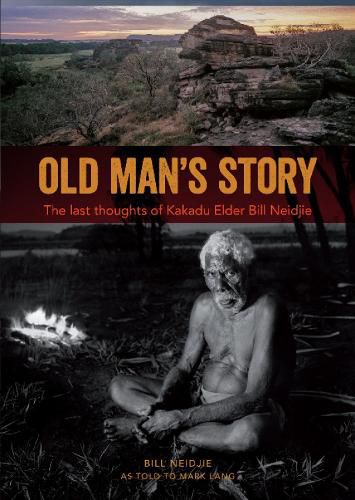Readings Newsletter
Become a Readings Member to make your shopping experience even easier.
Sign in or sign up for free!
You’re not far away from qualifying for FREE standard shipping within Australia
You’ve qualified for FREE standard shipping within Australia
The cart is loading…






‘Right then,‘ he said with a sigh, and then turned to me with a grin.
‘I tell you story, eh!’
Then he said something which really floored me: ‘I been waiting for you. You been waiting for me.‘
And so began Bill Neidjie’s relationship with English photographer, Mark Lang.
Known as ‘Old Man’ in this book, but often called ‘Big Bill Neidjie’ throughout his life because of his imposing height and strength, Bill Neidjie wanted to record aspects of his life for a younger generation of Gagadju, to help them look after their country and remember its stories - and for balanda, non-Aboriginal people.
Told in the old man’s words, this beautifully nuanced, impressionistic account allows Neidjie to gently emphasise the issues of importance to him. Old Man’s Story has a very personal inflection with Neidjie’s words complemented by Lang’s beautiful landscape photos. Structured in the cycle of the seasons, Old Man’s Story provides readers with insights into the annual trans-formation of landscape that are so integral to Neidjie’s life story.
$9.00 standard shipping within Australia
FREE standard shipping within Australia for orders over $100.00
Express & International shipping calculated at checkout
‘Right then,‘ he said with a sigh, and then turned to me with a grin.
‘I tell you story, eh!’
Then he said something which really floored me: ‘I been waiting for you. You been waiting for me.‘
And so began Bill Neidjie’s relationship with English photographer, Mark Lang.
Known as ‘Old Man’ in this book, but often called ‘Big Bill Neidjie’ throughout his life because of his imposing height and strength, Bill Neidjie wanted to record aspects of his life for a younger generation of Gagadju, to help them look after their country and remember its stories - and for balanda, non-Aboriginal people.
Told in the old man’s words, this beautifully nuanced, impressionistic account allows Neidjie to gently emphasise the issues of importance to him. Old Man’s Story has a very personal inflection with Neidjie’s words complemented by Lang’s beautiful landscape photos. Structured in the cycle of the seasons, Old Man’s Story provides readers with insights into the annual trans-formation of landscape that are so integral to Neidjie’s life story.
Old Man’s Story contains the last thoughts of the late Kakadu elder and activist, Bill Neidjie. His two previous books, Kakadu Man and Story About Feeling, are often read as poetry, but are also important articulations of an environmental philosophy grounded in feeling. The trope of the elder telling ancient stories might be seductive and sentimental, but what Neidjie is doing, committing secret knowledge to print, is a response to a very modern problem – our increasingly exploitative and unequal consumption of our planet. Neidjie reflects on how his community has changed in his living memory, recalling stories of his childhood and family. This sometimes melancholic narration is interwoven with Mark Lang’s memoir and photographs of his time in Kakadu with Neidjie over a cycle of seasons.
It is impossible to leave this beguiling, poetic book without reconsidering the way settler society privileges ‘objective‘ knowledge. Describing ‘country’ as something which can be felt in a bodily way, Neidjie maps out a vulnerable connection between humans and the rest of our environment. ‘Do something, with your feeling,’ advises Niedjie, ‘it not too late.’ The conversations in this book open up complex ideas about places in our recent history which are easy to overlook. The act of telling these (hi)stories is a way of confirming our extraordinary ecological present, but also of understanding each other. Having a story is the equivalent of being alive, and as readers, and writers – and booksellers – it’s a philosophy for which we should crusade.